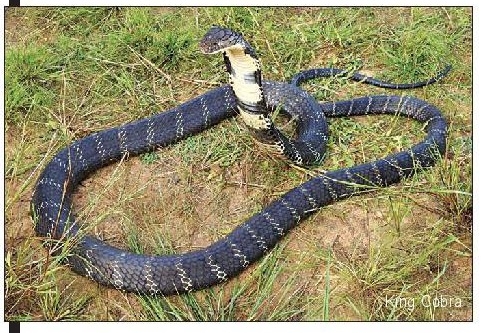Major King Cobraconservation project in Korba
02 Sep 2024 11:58:46

By Roshan Chachane :
RAIPUR,
Nova Nature, CG Forest Department’s
THE Nova Nature Welfare
Society, in collaboration with
the Chhattisgarh Forest
Department, has been
actively involved in studying the factors that affect the
existence of the King Cobra
to develop long-term conservation strategies for this
elusive species.
Led by M Suraj and Moiz
Ahmed, the society is
focused on protecting the
King Cobra population by
involving the local community in the Korba district,
which is the last remaining
stronghold of the species in
this region.
Chhattisgarh has 44
per cent of its land area
under forest cover, and a
large portion of its population relies on agriculture for
their livelihood.
This has led to frequent
human-snake encounters,
often resulting in retaliation
killings. In Korba, where the
pressure from human activities is intense, there have
been over 1,500 snake bites
in the past two years, and
the attitude towards snakes
is generally hostile.
Despite
these challenges, the Nova
Nature Welfare Society has
been able to foster a sense
of stewardship among the
locals through continuous
interventions, offering hope for the conservation of the King Cobra in central India.
The King Cobra, scientifically known as ‘Ophiophagus
hannah,’ is classified as ‘Vulnerable’ by the International
Union for Conservation of Nature (IUCN) and is listed
under Schedule I of the Indian Wildlife (Protection) Act,
1972, which provides the highest level of protection to
any species. The conservation efforts in Korba are further complicated by habitat destruction due to coal mining activities, such as those at the Gevra coal mine, Asia’s
largest coal-producing mine. For the past four years, the
Nova Nature Welfare Society has been building strong
relationships with local communities, involving them in
various projects to develop their skills and provide alternative livelihoods. By bridging the gap between government agencies and local communities, the society has
enhanced coordination and cooperation in managing
wildlife conflicts.
Recognising the importance of community involvement in wildlife conservation, the society has shifted its
focus from community-based to community-led interventions. They have identified and registered individuals from King Cobra habitats under the “Response Team”
initiative. This team is tasked with sensitizing locals, participating in rescue operations, sharing valuable information about King Cobras, and mitigating wildlife conflicts. Recently, under the guidance of Arvind PM, the
Divisional Forest Officer of the Korba Forest Division, a
day-long workshop was conducted to bring together
locals and the forest department.
The workshop aimed to build capacity among the participants and develop them as stakeholders in their respective villages. Over the past four years, with the help of
these community members, more than 30 King Cobra
and hundreds of other snake rescue operations have
been conducted. These individuals have also played a
vital role in fire control and raising awareness about the
King Cobra’s habitat. One notable member of the response
team, Jitendra Sarathi, has become a para biologist with
the society and is also associated with the state Forest
Department as an ethical wildlife rescuer. Senior biologists Mayank Bagchi and Siddhant Jain have been providing continuous technical support to these efforts,
ensuring that the conservation initiatives are effective
and sustainable. Through these collective efforts, the
Nova Nature Welfare Society and the Chhattisgarh Forest
Department are making significant strides in the conservation of the King Cobra in central India.
